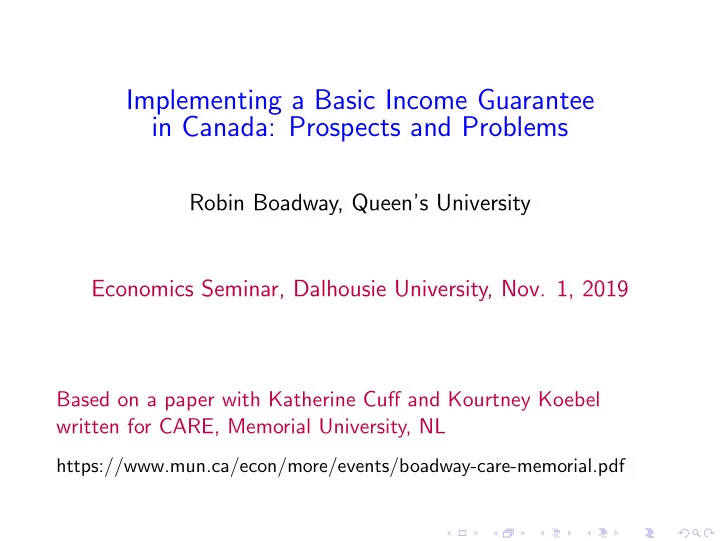

Implementing a Basic Income Guarantee in Canada: Prospects and Problems Robin Boadway, Queen’s University Economics Seminar, Dalhousie University, Nov. 1, 2019 Based on a paper with Katherine Cuff and Kourtney Koebel written for CARE, Memorial University, NL https://www.mun.ca/econ/more/events/boadway-care-memorial.pdf
Overview and Purpose ◮ To review the case for a BIG in Canada ◮ To summarize challenges in implementing it, including the need to involve both federal and provincial governments ◮ To outline an adequate and affordable BIG ◮ Implemented through the income tax system ◮ Drawing on Income Tax Collection Agreements experience ◮ Financed mainly from existing income-tested transfers OAS/GIS, SA, RTCs, NRTCs ◮ To illustrate the BIG proposal using simulations based on Statistics Canada’s SPSD/M database
Long History of Advocates ◮ Thomas More Utopia 1516 ◮ Antoine Caritat, Marquis de Condorcet 1794 ◮ Thomas Paine Agrarian Justice 1797: basic endowment and basic income, financed by land tax ◮ John Stuart Mill Principles of Political Economy 1849: fairness/utilitarian argument ◮ Henry George 1871: basic income financed by land taxation ◮ Bertrand Russell 1918: a certain income, sufficient for necessaries, paid to all whether they work or not ◮ Major Douglas 1924 Social Credit: national dividend to address over-production and reluctance of banks to lend ◮ James Meade 1936 and GDH Cole 1935: social dividend from common social heritage that all citizens should share
More Recently, ◮ Economists ◮ Hayek, Tinbergen, Friedman, Simon: NIT or flat tax ◮ Galbraith, Tobin, Reich: progressive version of NIT ◮ Atkinson, Osberg: participation income ◮ Mirrlees: optimal income tax ◮ Roemer: equality of opportunity ◮ Fleurbaey-Maniquet: fairness ◮ Entrepreneurs: Richard Branson, Elon Musk, Eric Schmidt, Andrew Yang, Mark Zukerberg ◮ Leading proponents: Belgian philosopher Philippe van Parijs, UK social economist Guy Standing who founded BIEN ◮ UN Universal Declaration of Human Rights 1948 ◮ Recently proposed by IMF to address inequality ◮ Consistent with ESDC Poverty Reduction Strategy
Canadian Proponents ◮ 1971: Special Senate Committee on Poverty (Croll Report), Castonguay-Nepveu Report, Status of Women Committee ◮ 1976: National Council of Welfare ◮ 1985: Macdonald Royal Commission, Forget Commission ◮ 2006: Women’s Livable Income Working Group, Standing Committee on Agriculture and Forestry ◮ 2008: Senate report on poverty ◮ Politicians: Liberal policy resolution, Green party, Guy Caron, Hugh Segal, Art Eggleton, Kim Pate, city councils and mayors ◮ Medical & public health groups: CMA ◮ CEOs for Basic Income
And Detractors ◮ Economists: Probably many, including Jonathan Rhys Kesselman, Kevin Milligan, etc. ◮ Policy people: Armine Yalnizyan, Andrew Jackson, etc. ◮ Institutes ◮ Caledon Institute (Ken Battle, Sherri Torjman) ◮ Canadian Centre for Policy Alternatives (David MacDonald) ◮ Fraser Institute (Charles Lamman, Hugh McKenzie) ◮ Various trade unions
Experimentation and Implementation Various experiments, pilots and studies ◮ Dauphin MB MINCOME experiment 1974–79 ◮ Various NIT random control experiments in US ◮ Recent pilots in Ontario, Finland, India, Kenya, Netherlands ◮ Proposed pilot for Oakland and Stockton CA ◮ Referendum on UBI in Switzerland 2016 ◮ Research study launched by BC government 2019 Some partial applications ◮ Alaska Permanent Fund Dividend & Iran Basic Income (oil) ◮ UK Child Trust Fund 2005–11 ◮ Alberta Social Credit 1933 and Prosperity Bonus 2005 ◮ Brazil Bolsa Familia ◮ Greek Social Security Income
Arguments for a Basic Income Guarantee I Context ◮ Growing inequality and failure of redistribution policies ◮ Dramatic fall in real welfare incomes since early 1990s ◮ Increase in earnings volatility, precariousness of employment ◮ Self-reinforcing nature of poverty, including across generations Element of Redistribution and Poverty Reduction Policy ◮ Ability to pay and equal sacrifice ◮ Utilitarianism and optimal income taxation ◮ Altruism of the rich?: Pareto optimal redistribution ◮ Equality of opportunity ◮ Entitlement to common social dividend: value of institutions, accumulated knowledge, natural resources
Arguments for a Basic Income Guarantee II Other Benefits ◮ Social investment: effect on nutrition, health, education outcomes, crime ◮ Facilitation of entrepreneurship ◮ Improved well-being, life chances, independence, ability to participate, opportunity for one’s children ◮ Elimination of stigmatization and improved social norms ◮ Improved take-up of entitlements ◮ Social insurance against precarious employment, temporary jobs, trade and technology shocks (with EI) Complementary to social services, employment creation, housing, social insurance, etc.
Arguments against a Basic Income Guarantee ◮ Work effort and participation in labour force = ⇒ But, assumes elastic labor demand ◮ Should those who choose leisure be given money by the state? = ⇒ Alternative is participation basic income = ⇒ More generally, recipients will misuse basic income ◮ Affordability: BIG based on poverty rate ` a la ESDC is costly ◮ Political feasibility: cost borne by middle income earners ◮ Inferior to piecemeal approaches to poverty reduction? ◮ May detract from employment policies, and public services
What is a Basic Income Guarantee? Two Equivalent Views 1. Universal Basic Income (UBI) ◮ Common payment B to all regardless of circumstance ◮ B paid upfront, Y taxed at fixed rate t : Figure 1 ◮ Budget constraint solid line: C = (1 − t ) Y + B ◮ Net receipt from government B − tY � 0 2. Income-Tested Basic Income (ITBI) ◮ Individual receives B net of taxback rate: B − tY ◮ Phased out at Y = B / t ◮ Above phase-out, income taxed at rate t ◮ Net amount received = Y − tY + B , same as under UBI Difference between UBI and ITBI is timing
Recommend
More recommend